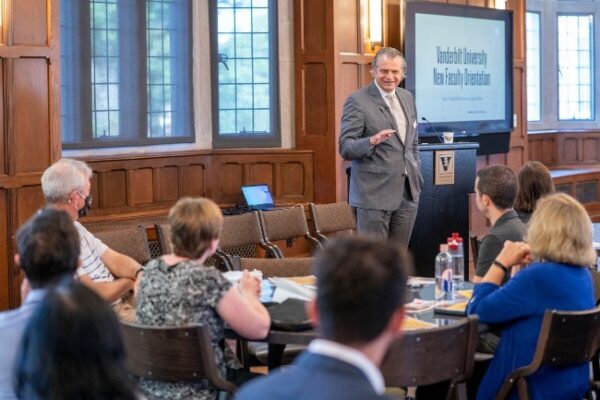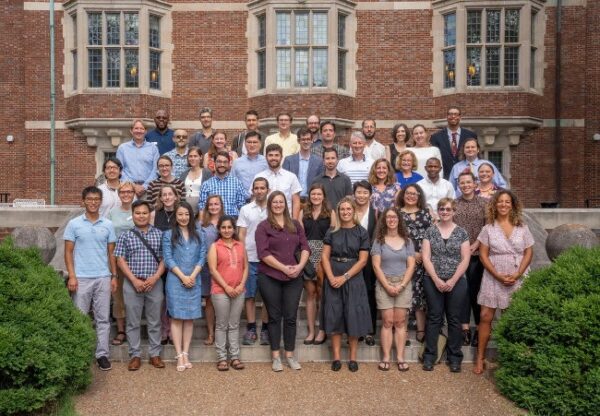As Vanderbilt prepares for the coming school year, the university is celebrating the arrival of a diverse group of more than 100 esteemed scholars from many institutions and areas of expertise.
Chancellor Daniel Diermeier personally greeted many of the new faculty members during an orientation on Aug. 12 in Alumni Hall.

“At Vanderbilt, it’s very clear: We want to attract and bring the best people to campus and put them in an environment where they can succeed,” Diermeier said at the event. “We believe this is best done in a collaborative environment. There is no other university that is as collaborative and has as much of a sense of community as Vanderbilt has.”
This year’s group of new faculty members reflects the university’s strengthened recruitment efforts made possible through Destination Vanderbilt, a $100 million initiative launched in September 2020 to attract the world’s leading and emerging faculty in key disciplines. Destination Vanderbilt is designed to expand the hiring of outstanding faculty over and above existing plans for each school and college during a two- to four-year period.
Joining Vanderbilt’s 10 schools and colleges this year are more than 100 experts and scholars across a wide range of disciplines, including philosophy, cinema, quantum computing, neuroscience, cell biology, music and politics. Others have research-based interests in machine learning, LGBTQI mental health and suicide prevention, science education, cognitive processing and predictive coding, and church and society. Among their honors are National Science Foundation CAREER Awards, Grammys, multiple teaching awards and other recognitions.
The record number of new faculty are also geographically diverse, coming to campus from nearly two dozen states and at least six other nations: Brazil, China, France, Germany, Italy and the United Kingdom.
Diermeier noted in his remarks that he had been a new faculty member in July 2020 when he first stepped onto campus as chancellor. He said the faculty and staff’s common set of values, including a strong determination to work together for the greater good, helped Vanderbilt navigate the pandemic stronger than ever.
“Everyone in our community pulled together at the end of the day, and that allowed us to invest in faculty and students during a time when many of our peers were pulling back,” Diermeier said. He also highlighted the benefits of Vanderbilt’s being situated in Nashville, describing the university’s hometown as a “sophisticated, creative, bustling and very open city.”
Cybele Raver, provost and vice chancellor for academic affairs, joined Diermeier in welcoming Vanderbilt’s newest faculty members, noting that she has also just crossed this institution’s threshold and is excited to begin the next chapter of her career.
“I’ve been struck not only by the intellectual rigor at Vanderbilt, but also by the warmth of everyone’s welcome, the genuine way in which people truly greet each other here, the way that people genuinely connect,” Raver said. “A good example is just how people lean in to really listen when someone else is talking, conveying respect even when expressing strongly differing opinions.”
She cited Vanderbilt’s visionary leadership and ambitious goals for making the world a better place as among the top reasons she joined Vanderbilt. “It’s important to recognize that these bold aspirations are collectively designed with faculty in a unique and collaborative way,” Raver said. “Each of you—having been invited to come here and deciding to join us—is a testament to that commitment to academic excellence.”
The daylong faculty orientation featured several panels with academic leaders and university administrators who shared resources, pivotal moments and perspectives to help guide the new hires on their Vanderbilt path. These included:
- The Faculty Experience at Vanderbilt, with panelists Larry Bartels, May Werthan Shayne Chair of Public Policy and Social Science and co-director, Center for the Study of Democratic Institutions; David Owens, professor of the practice of management and innovation and Evans Family Executive Director of the Wond’ry; Keivan Stassun, Stevenson Chair in Physics and Astronomy, professor of computer science and director of the Frist Center for Autism and Innovation; and Emilie M. Townes, dean of the Divinity School and distinguished professor of womanist ethics and society.
- Learning at Vanderbilt, with panelists Doug Christiansen, vice provost for university enrollment affairs, dean of admissions and financial aid, and associate professor of public policy and higher education; Melissa Gresalfi, dean of The Martha Rivers Ingram Commons and professor of teaching and learning; and Derek Bruff, assistant provost, executive director of the Center for Teaching, interim director of the Digital Commons and principal senior lecturer of mathematics.
- Discovery at Vanderbilt, with Vanessa Beasley, vice provost for academic affairs, dean of residential faculty and associate professor of communications studies; André Christie-Mizell, vice provost for graduate education, dean of the Graduate School and Centennial Professor of Sociology; and Padma Raghavan, vice provost for research and professor of computer science.
- Ethics at Vanderbilt, with Bart Quinet, assistant provost and university registrar; G.L. Black, assistant provost and dean of students; Stephanie Roth, associate vice chancellor for equal access; and Mary Roy, director and Title IX coordinator.

New faculty also had the opportunity for enrichment experiences (open to all faculty) in the Civil Rights Room and the Votes for Women Room at the Nashville Public Library as well as on the Vanderbilt campus, where arboretum tours and an overview of the breadth of services provided by Vanderbilt Facilities were offered. Other faculty development sessions to offer deep dive into topics introduced at orientation and others are being planned throughout the academic year.